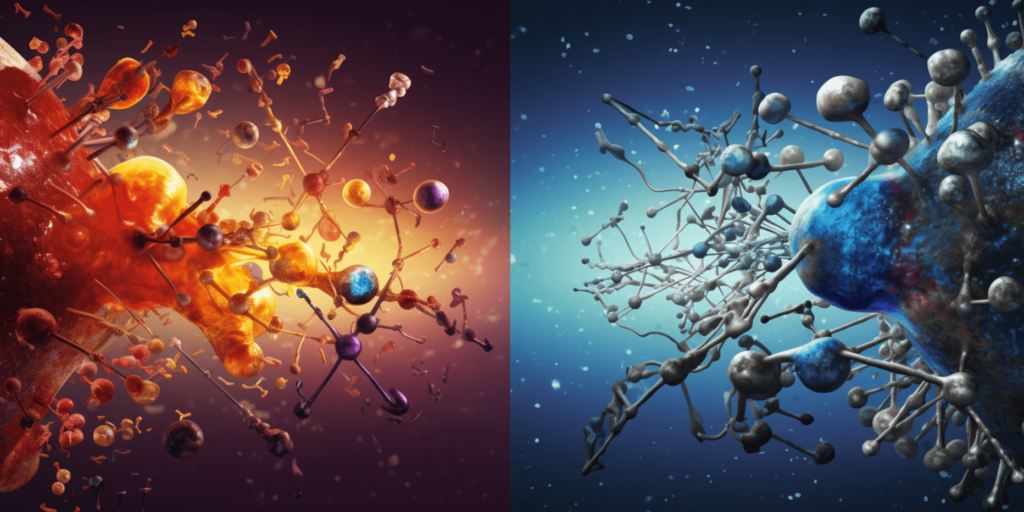Serotonin and dopamine: two chemical names that we’ve all heard before, but what do they really mean? And more importantly, how do they affect our bodies and minds?
To start with, serotonin and dopamine are neurotransmitters. They’re the messengers in our brain’s communication system, carrying signals between neurons (brain cells). Each of them plays a different role in regulating our mood, motivation, sleep patterns and much more.
While serotonin is often linked to feelings of well-being and happiness, dopamine is dubbed the “feel-good” hormone for its part in reward-driven behavior. But it’s not as simple as one being ‘good’ and the other ‘bad’. The reality is that these chemicals work together to keep us functioning at full capacity. So let’s dive into understanding these fascinating neurotransmitters better…
Understanding Serotonin: The Feel-Good Chemical
We often hear serotonin referred to as the ‘feel-good chemical’, a term that’s certainly not without merit. It’s one of our body’s key neurotransmitters, playing an essential role in regulating mood, sleep, appetite, digestion, and even memory. With such a wide array of responsibilities, it’s no surprise that when serotonin levels are off kilter, we can find ourselves feeling out of sorts.
A large portion of our body’s serotonin is found in the gut or digestive tract. There it works diligently to regulate bowel movements and function. But it doesn’t stop there – about 10% is produced in the brain where it helps regulate mood. This balance between the mind and body is crucial for maintaining overall well-being.
When we’re experiencing high levels of stress or anxiety, our body produces less serotonin than normal. This can lead to feelings of depression and other mental health issues. That’s why medications like selective serotonin reuptake inhibitors (SSRIs) exist— they act on this very principle by helping to increase levels of serotonin in the brain.
Now let’s talk numbers:
| Function | Percentage |
|---|---|
| Gut function | 90% |
| Mood regulation | 10% |
This doesn’t mean that boosting your serotonin will magically make all your problems disappear – but understanding its role can certainly help us understand more about how our bodies work.
So just remember: when you’re feeling down or stressed out – take care! Your body might just be telling you that your feel-good chemicals need a little boost!
Role of Dopamine: The Reward Molecule
Let’s get this straight – I’m a big fan of dopamine. It’s often dubbed as the “feel-good” neurotransmitter and it plays a vital role in how we feel pleasure. But there’s more to dopamine than just making us feel good.
First off, dopamine is crucial for several important functions in our bodies, not just mood regulation. It aids in regulating movement and emotional responses as well as enabling us not only to see rewards but to take action to move towards them.
Here are some key points about dopamine:
- Dopamine is produced in several areas of the brain including the substantia nigra and the ventral tegmental area.
- It’s released by neurons to send signals to other nerve cells.
- Dopamine plays a significant role in reward-motivated behavior.
Now let’s talk about something really interesting – the link between dopamine and addiction. When you experience something enjoyable, your brain releases dopamine. That rush or feeling of pleasure you get when eating chocolate or winning at your favorite game? That’s your brain being flooded with dopamine. In fact, most drugs and addictive substances increase levels of this neurotransmitter which can lead to an increased desire for repeated use.
However, don’t be fooled into thinking that more is always better when it comes to this powerful molecule! Too much or too little can have adverse effects on health leading conditions like Parkinson’s disease (low levels) or schizophrenia (high levels).
So next time you’re savoring that perfect cup of coffee or relishing a victory lap after reaching a goal, remember – it’s all thanks to our friend, dopamine!
Comparing Serotonin and Dopamine Functions
Diving right into it, let’s explore the complex world of neurotransmitters. To start things off, I’ll share a little about serotonin. Often referred to as the ‘feel good’ hormone, serotonin regulates mood, social behavior, appetite and digestion, sleep, memory and sexual desire. It’s primarily found in our brain, bowels and blood platelets.
Shifting gears a bit to dopamine now. This neurotransmitter is linked with pleasure and reward. It plays a significant role in how we perceive reality, make decisions and take actions based on rewards or punishments from our environment.
Now you’re probably wondering why we’re comparing these two very important neurotransmitters? Well, that’s because they have overlapping functions but also distinct differences which makes them unique.
Let’s dive deeper into their similarities:
- Both affect mood regulation
- They impact how we respond to rewards
- Each plays a part in regulating sleep
Despite these similarities though, they have their own unique characteristics that set them apart:
- Serotonin is more involved with regulating body temperature while dopamine isn’t.
- In contrast to serotonin’s role in inducing sleepiness after meals (tryptophan high), dopamine keeps us alert during the day.
- While both are related to mood disorders like depression; low levels of serotonin are often associated with anxiety disorders whereas low levels of dopamine can lead to Parkinson’s disease.
In conclusion (but not really concluding because there’s so much more to this topic), it becomes clear just how intertwined yet distinct these two vital neurotransmitters are when it comes down to regulating various functions within our bodies! We’ll continue delving into this fascinating subject in upcoming sections of this article.
Serotonin Vs. Dopamine: Which Impacts Mood More?
We often hear about serotonin and dopamine when it comes to our mood, but what exactly are they? And more importantly, which one has a more significant impact on our mood?
Let’s start by defining these two vital neurotransmitters. Serotonin is popularly known as the ‘feel-good’ hormone. It plays a crucial role in regulating mood, appetite, sleep, memory and learning. On the other hand, dopamine is commonly recognized as the ‘reward’ hormone that regulates pleasure and reward, motivation and movement.
While both these neurotransmitters play essential roles in maintaining our mental well-being, there’s a slight difference in how they affect our moods.
- Serotonin primarily influences our overall sense of well-being and happiness. Low levels of serotonin have been linked with depression – that’s why many antidepressants work by increasing serotonin levels in your brain.
- Dopamine, conversely, is responsible for feelings of pleasure or reward that motivate us to strive for goals. When you achieve something—whether it’s finishing a task or winning at a game—your brain releases dopamine making you feel pleased or satisfied.
Now let’s break down some numbers:
| Neurotransmitter | Function | Effects of Imbalance |
|---|---|---|
| Serotonin | Regulates mood & sleep | Depression |
| Dopamine | Regulates pleasure & reward | Parkinson’s disease |
You can see from the table above that while both serotonin and dopamine significantly affect our mood – an imbalance can lead to different conditions.
In conclusion (without using “In conclusion,”), both serotonin and dopamine play critical roles in determining our moods—but not exclusively so. They each contribute uniquely to various aspects of mental health; hence their impact on mood cannot be weighed against each other definitively.
How to Increase Serotonin Levels Naturally
Feeling down and out? Maybe it’s time to give your serotonin levels a boost. But how do you do that naturally? Well, I’m here to illuminate the path for you.
First off, let’s think about our diet. Foods rich in tryptophan, an amino acid that helps produce serotonin, can be a big help. We’re talking turkey, eggs, cheese, pineapples and even tofu! So next time you’re at the grocery store, don’t forget to toss in some of these serotonin-boosting treats into your cart.
Now onto exercise – no one ever said it was going to be easy! Regular physical activity is known to enhance serotonin production in the brain. It doesn’t mean you need to start training for a marathon though! Even moderate exercises like walking or gentle yoga can go a long way towards boosting those feel-good hormones.
Another natural route I highly recommend is getting more sunlight. You see, bright light has been shown to trigger serotonin production. So whether it’s taking your morning coffee outdoors or simply opening up those curtains wide – every little bit of sunshine counts!
Last but not least: manage stress better. This might sound easier said than done but remember that chronic stress takes a toll on our body’s ability to produce serotonin. One effective technique could be mindfulness meditation which has been proven by science as an effective way of reducing stress and anxiety.
So there we have it – four natural ways to increase your body’s production of this essential mood-boosting hormone:
- Eat foods high in tryptophan.
- Get regular exercise.
- Spend more time under bright light.
- Keep stress levels low with techniques such as mindfulness meditation.
Remember folks: when everything seems dark and gloomy – there might just be a lack of serotonin at play!
Natural Ways to Boost Dopamine Production
Increasing your body’s dopamine production isn’t as tricky as it sounds. It’s all about adopting a few lifestyle changes and habits that can work in your favor. Here, I’ll share some of the most effective ways you can naturally boost your dopamine levels.
First on the list is staying active. Regular physical activity does wonders for dopamine production. It not only pumps up your endorphin levels but also increases the release of dopamine in your brain. You don’t have to go full-blown gym mode; light exercises such as yoga, brisk walking or even dancing can do the trick!
Eating foods rich in tyrosine might be something you want to consider too. Tyrosine is an amino acid that plays an important role in producing dopamine. Foods high in tyrosine include:
- Almonds
- Bananas
- Avocados
- Eggs
- Fish
- Chicken
Getting plenty of sleep is another natural way to increase dopamine production. Sleep deprivation decreases the production of this feel-good hormone, so make sure you’re catching enough zzz’s every night.
Reducing stress should be a no-brainer when it comes to boosting dopamine levels naturally. High-stress environments and situations deplete our brains’ supply of dopamine, making us feel anxious and overwhelmed. Taking time out for relaxation techniques such as meditation, deep breathing exercises or simply unwinding with a good book can help maintain healthy levels of this neurotransmitter.
Finally, let’s not forget about probiotics – those friendly gut bacteria play a significant role in balancing our brain chemistry! Certain strains of probiotics have been found to increase the production of dopamine.
Remember, while these tips may work for many people they are not guaranteed fixes for everyone since we’re all unique individuals with different bodies and health conditions! Always consult with a healthcare professional before making any major changes to your diet or exercise regimen.
Implications of Imbalance Between Serotonin and Dopamine
It’s often overlooked, but the fine balance between serotonin and dopamine in our brains is crucial for maintaining our mental well-being. When this delicate equilibrium tilts, it can lead to a variety of health issues. For instance, individuals suffering from depression often have low levels of serotonin. This neurotransmitter plays a vital role in regulating mood, sleep, appetite, memory, and learning. So you see how essential it is to keep these chemical levels balanced!
On the flip side of the coin lies dopamine—the reward chemical. It’s associated with pleasure and motivation. Yet an excess of dopamine may result in conditions like schizophrenia or attention deficit hyperactivity disorder (ADHD). Conversely, a deficiency might lead to Parkinson’s disease–a neurodegenerative condition characterized by tremors and difficulty with movement.
Now let’s delve into some numbers that demonstrate this further:
| Condition | Neurotransmitter | Impact |
|---|---|---|
| Depression | Low Serotonin Levels | Affects mood regulation leading to persistent feelings of sadness |
| Schizophrenia/ADHD | High Dopamine Levels | Leads to hallucinations or impulsive behavior |
| Parkinson’s Disease | Low Dopamine Levels | Causes tremors and difficulty with movement |
These examples illustrate how imbalances between serotonin and dopamine can significantly impact one’s well-being.
The interaction between serotonin and dopamine isn’t just about quantity; timing also matters! They must be released at specific times for optimal function—a process known as burst firing. If there’s too much burst firing (leading to high levels) or not enough (resulting in low levels), we may experience problems such as anxiety or addiction.
So what causes these imbalances? Factors range from genetics to lifestyle choices including diet, exercise habits — even exposure to stress! That’s why it’s vital we take care of ourselves physically AND mentally, for a balanced brain chemistry.
In the end, it’s all about balance. Neither too much nor too little of these chemicals will do us any good. So here’s to maintaining an optimal level of serotonin and dopamine in our lives!
Conclusion: Balancing Serotonin and Dopamine for Optimal Health
Striking a balance between serotonin and dopamine in our bodies isn’t just important, it’s crucial for maintaining optimal health. These two neurotransmitters have a profound impact on our mood, motivation, sleep patterns, and overall sense of well-being.
It’s essential to understand that both serotonin and dopamine play unique roles in the body. While they may sometimes seem at odds with each other, they’re actually complementary forces. You can think of them as two sides of the same coin.
A diet rich in certain nutrients can help maintain healthy levels of both neurotransmitters. Foods high in tryptophan like turkey, eggs, and cheese can boost serotonin production. Meanwhile, foods loaded with tyrosine such as lean meats, dairy products, fruits, and vegetables aid dopamine production.
Exercise is another excellent way to naturally boost these neurotransmitters levels. It increases blood flow to the brain enabling it to produce more serotonin and dopamine.
Let’s not overlook the importance of proper rest either. Getting enough sleep allows your brain to recharge its supply of these vital neurotransmitters.
To sum up everything I’ve discussed:
- Both serotonin and dopamine are crucial for optimal health
- They play distinct yet complementary roles
- Diet plays an important role in maintaining healthy levels
- Exercise boosts their natural production
- Adequate rest replenishes their supplies
So there you have it! Now you know why it’s critical to keep your serotonin and dopamine levels balanced. Just remember that if you’re struggling with anxiety or depression symptoms despite doing all right things – don’t hesitate to reach out for professional help.



